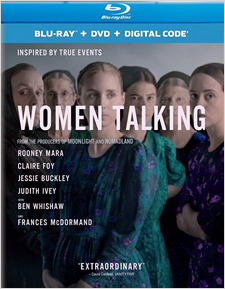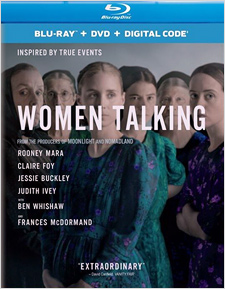Women Talking (Blu-ray Review)

Director
Sarah PolleyRelease Date(s)
2022 (March 7, 2023)Studio(s)
United Artists Releasing (Universal Pictures Home Entertainment)- Film/Program Grade: B+
- Video Grade: A
- Audio Grade: A-
- Extras Grade: F
Review
Writer/director Sarah Polley’s powerful 2022 film Women Talking is adapted from the 2018 novel by Miriam Toews, which was itself inspired by a real incident that occurred in Bolivia between 2005 and 2009. Women and children in a small Mennonite colony were waking up in the morning to find out that they had been raped in the middle of the night, with their clothes torn and blood on their sheets—sometimes with rope still tied around their wrists and ankles. Despite the physical evidence, since none of them could remember anything, the leadership of the colony dismissed their complaints as being the result of overactive female imagination, or possibly the work of Satan. The rapes continued for years until it was discovered that the colony’s veterinarian had transformed an anesthetic used for cows into aerosol form, and he helped eight other men to spray it through windows to render the entire households unconscious. It wasn’t until two of them were caught breaking and entering in 2009 that this whole scheme unraveled.
Eight of the nine conspirators were turned over to Bolivian authorities, with one of them escaping to Paraguay before he could be brought to justice. Eventually, seven of them were sentenced to 25 years for rape, while the veterinarian received a shorter sentence of 12 years, since had only aided the others. Officially, there were 151 female victims ranging in age from 3 to 65 years old, but not all of the women were included in the trial, so the actual number was doubtless even higher than that. Apparently, there were some men and boys assaulted during the same time frame, but the colony kept that fact private, so it wasn’t part of the legal tally. There’s also evidence that the rapes continued even after these men were convicted. Significantly, in the highly patriarchal Mennonite culture, none of the women could represent themselves before the courts. Instead, their husbands or fathers were listed as the plaintiffs in the case.
Toews used the Bolivian incident as a launching point for her novel, describing Women Talking as “both a reaction through fiction to these true-life events, and an act of female imagination.” She gave a voice to those women who had been denied their own agency, with the irony being that she had to imagine those voices in the same way that the men claimed that the women had imagined the rapes. Sarah Polley opens her adaptation with a simplified title card: “What follows is an act of female imagination.”
In this fictionalized retelling, the men who have committed the rapes have been turned over to the authorities not out of a desire to punish them, but rather to keep them safe from the wrath of the women. The men of the colony have banded together to travel to the city and bail out the perpetrators, leaving the women with an ultimatum: forgive their attackers when everyone returns in two days, or else leave the colony forever, and be denied entry into the kingdom of heaven. The women decide to hold a vote among themselves between doing nothing, staying and fighting, or leaving forever. When that vote results in a tie, members of three families are elected to meet and decide what the women of the colony should do. Since they’ve all been denied the same schooling as the men, and can barely read or write, they bring in the young male schoolteacher to provide a record of what these women have to say. Women Talking stars Rooney Mara, Claire Foy, Jessie Buckley, Judith Ivey, Ben Wishaw, and Frances McDormand (who also served as one of the producers).
While Toews and Polley added the men’s ultimatum to the women, as well as their willingness to bail out the accused rapists, there’s a grain of truth to both elements. The Bolivian rapists protested their innocence, claiming that their confessions were coerced, and many of the other men of the colony have pushed for their release—and the women have indeed been pressured to forgive them. Women Talking is about many things, but it underscores the ways in which repressive religious societies use fear of eternal judgment to keep women in their place. Mennonite groups like this one may be an extreme example, but women in religious orders of all sorts are frequently taught that it’s their sacred duty to be submissive to men, and to meekly forgive instances of outright abuse or rape.
Recent events have also served as a reminder that many much more mainstream religious organizations than the Mennonites will still work to actively suppress reports of rampant sexual assault within their own denominations, shaming the victims into compliance. While Women Talking is inspired by a specific example of this kind of thing, Polley chose to keep the location and timeframe of her version of the story vague (although she does offer a few clues along the way). As a result, Women Talking has an appropriately timeless quality—it’s a story that’s been repeated in different forms for millennia, and unless women are indeed allowed to have their own voice regardless of religious dogma, it will continue to be repeated for ages to come.
Cinematographer Luc Montpellier captured Women Talking digitally at 8K resolution in Redcode RAW format with Panavision DXL2 cameras. He used Panavision Ultra Vista prime lenses with a 1.65 anamorphic squeeze, which resulted in an aspect ratio of 2.76:1. That’s the same ultra-wide ratio of the classic Ultra Panavision 70 and MGM Camera 65 formats, although both of those used lenses with a 1.25 anamorphic squeeze instead (the 70 mm film frame is wider than that of the DXL2’s RED Monstro sensors). Montpellier and Polley wanted the sense of scope from the wider frame, but without all of the sharpness of modern digital cinematography—they embraced the shallow depth of field and softness at the edges of the frame that the Ultra Vista lenses provided. There’s no information available regarding the resolution at which post-production work was completed, but given the 8K sensors, it’s likely that it was a 4K Digital Intermediate.
In any event, Universal made the decision not to release Women Talking on 4K Ultra HD, and to limit physical media for it to Blu-ray (4K is available on Digital and streaming only). That’s a shame, but on the other hand, the large-format cinematography has resulted in an outstanding Blu-ray presentation. It won’t be for all tastes in any version, since the image is heavily desaturated to give everything a Gothic feel, with only a few moments that intentionally offer stronger saturation. Everything is crisp and clear, with well-resolved facial textures—Claire Foye’s skin is always a good litmus test for how well that fine details are defined, and the subtle details in her complexion are properly reproduced here. There is some softness at the edges from the anamorphic lenses, and the focal plane is indeed quite shallow, but when things are sharp, they’re razor sharp. The black levels aren’t always the deepest, but that does appear accurate to how things were originally captured—although it also seems that an HDR grade could have provided better resolution within the darker end of the contrast range. Not releasing Women Talking on UHD may have been a missed opportunity on Universal’s part, but this is still a gorgeous Blu-ray.
Audio is offered in English 5.1 DTS-HD Master Audio, French 5.1 DTS, and English Descriptive Video Service, with optional English SDH, Spanish, and French subtitles. Women Talking is a dialogue-centric film, and appropriately enough, this is a dialogue-centric mix. There are some light ambient effects in the surrounds, but they’re deliberately muted so as not to distract from what these women are saying. There’s also a bit of reverberant support for Hildur Guðnadóttir’s score, but again, nothing is allowed to take away from the dialogue.
Universal’s Blu-ray release of Women Talking is a two-disc set that includes a DVD with a 480p copy of the film, a slipcover that matches the artwork on the insert, and a Digital Code on a paper insert tucked inside. That’s it. There are no extras whatsoever, not so much as a trailer. That’s yet another missed opportunity on Universal’s part, which does beg the question of whether or not they’ll eventually sublicense Women Talking to a boutique label like Criterion or Arrow. Anything is possible, but that’s little more than speculation at this point. In the meantime, Women Talking still needs to be seen (and heard!) in whatever format is available, and Universal’s Blu-ray offers a high-quality presentation of it.
- Stephen Bjork
(You can follow Stephen on social media at these links: Twitter and Facebook.)

